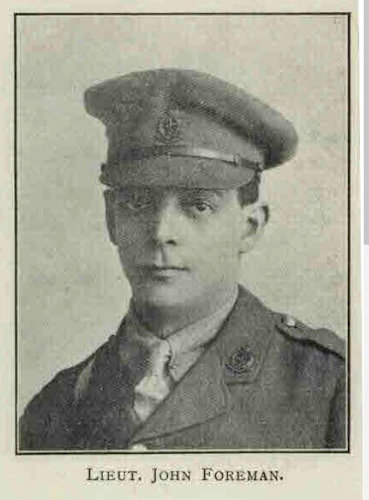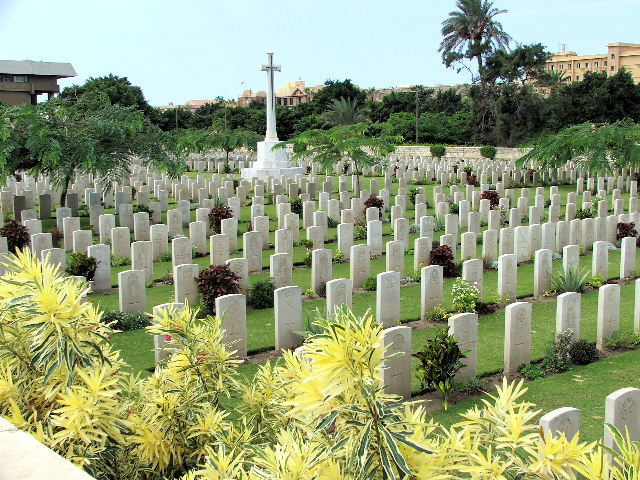Name
John Eugene Foreman
Conflict
First World War
Date of Death / Age
09/07/1917
Rank, Service Number & Service Details
Lieutenant
Royal Army Medical Corps
Awards: Service Medals/Honour Awards
Not Yet Researched
Cemetery/Memorial: Name/Reference/Country
ALEXANDRIA (HADRA) WAR MEMORIAL CEMETERY
B. 18.
Egypt
Headstone Inscription
Not Researched
UK & Other Memorials
St Edmunds College Memorial, Old Hall Green
Biography
The following text was transcribed from The Edmundian (1914-1919) – The contemporary magazine of St Edmund’s College:
Another son of St. Edmund's' whose loss we have to deplore is Dr. John Eugene Foreman, M.R.C.S., L.R.C.P., who died on service on July 9th last.
He was born on January 8th, 1883, in the West Indian Island of St. Thomas and was the only son of Dr. John A. Foreman who is Government Medical Officer for the Island of St, Kitts.
When only nine years old he showed exceptional musical capabilities, even at that early age playing the violin at local concerts. His father recognising this talent decided to send him to Europe to be trained in the musical profession. Consequently when about ten years old he was sent to France, and there his musical talents, both on the piano and violin, were recognised to be much above the ordinary for one so young. He had been studying music and French for some time when his parents went to France to see him and found great progress had been made. However, through the influence of an aunt in France his parents were persuaded to give him an English education, and to let music be an accomplishment rather than his profession.
Towards the end of 1894 his parents brought him to England and placed him at Tooting College where he remained till 1897 when he was transferred to St. Edmund's in the month of September. While here he soon won popularity amongst his companions on account of his generous nature and his proficiency at games, especially cricket and billiards in which he excelled. Whatever he took to he went in for thoroughly, and so it was that while at the College he devoted all his time to the study of music, French, mathematics, cricket and billiards, in all of which he was easily best in his class. He represented the College in the first XI at cricket the last year he was at St. Edmund's and could generally be relied upon to make a good score.
Electrical engineering was the profession his father had selected for him and with this end in view he was sent from St. Edmund's in 1899 to Chester for a few months' “cramming", From there it was arranged that he should go to Edinburgh to take his course of studies in engineering. After a few months there, however, his father expressed the wish that John should take up his own profession and become a doctor. For this purpose he went to the London Hospital in 1900 where, from the very first, he applied himself with great zeal to his new studies. He distinguished himself both in his work and devotion to duty. He passed all his examinations in the minimum time and with great success. He was qualified in 1906 and for some time acted as assistant to a doctor at Chipping Norton. He eventually bought a practice at Bedford Park which he set his mind to work up. He found his task involved more uphill work than he had anticipated as there was a great deal of local competition. But with his usual courteous and generous manner, combined with hard work and lack of holidays he was able to increase his connection to such an extent that at the end of seven years he sold his practice for a substantial sum. In 1913 he moved to Southbourne near Bournemouth where he started to build up a new practice till the early part of the War when he volunteered for work in France in the R.A.M.C. Being rejected for foreign service on medical grounds he gave up his increasing practice to become R.M.O. at the Boscombe Military Hospital where he won the high esteem of all with whom he came in contact. Early in 1917, in spite of the sacrifice he had already made, and a previous rejection on the. grounds of health, he felt impelled to apply for a commission, which he obtained on March 3rd. He was ordered to Egypt and embarked in the S.S. Arcadian on March 29th. While passing through the Mediterranean the ship was torpedoed on April 15th and 300 men were drowned. John managed with great difficulty to save himself and with the aid of a rope to get into one of the boats. He spent a whole night in the boat and after he suffered great hardships the boat reached the shore of an uninhabited island of the "Cyclades" group, where. another day and a night were spent. The next day they were rescued by a mine sweeper Which look them to a French port, where they remained for ten days. It is recorded that the young doctor, although badly wounded in both hands, was unremitting in his attention and devotion to his wounded companions, several of whom he rescued from the sea, who were with him in the boat; he took no rest so long as he could be of any use to others. He was eventually sent on to Alexandria, but arrived in such a weak condition that he was admitted to hospital. Two or three days after being rescued he developed scarlet fever, then dysentery, quinsey, and lastly enteric fever and haemorrhage of which he died on July 9th at the age of 34.
John Foreman was one of those exceptional characters who are favourites wherever they go. In his professional work he always entered into the feelings of others, being of a very sympathetic and generous nature. He excelled in everything he took up. He was a gifted amateur musician, playing the piano, violin and 'cello equally well; he was an excellent billiard player and cricketer and won many cues and bats at School, the Hospital, Bedford Park and Bournemouth. He was also an amateur mechanic of no mean order. All through his hie his musical tastes seemed combined with everything. A good deal of his spare time was spent at the piano composing pieces; at other times he would turn to his violin or 'cello. When at Bedford Park he organised and conducted his own orchestra, and through his music he made many lasting friends.
In June, 1908, he married Miss Bessie Longstaff who with their three daughters is left to mourn his loss.
We cannot conclude this notice without quoting from a letter written by the Chaplain at Alexandria. . . . "Not only did he receive the Last Sacraments, but during his illness he sometimes had Holy Communion several times in the week as this was the only thing he craved for. He was one of the finest Catholics I have ever met and his example had a great influence on the other patients in the ward. After his wife and family his wily Anxiety was about his own soul, and knowing Him as I did I feel sure he must have received almost immediately his eternal reward. You can well imagine he suffered greatly, but like the magnificent Catholic he was he bore his sufferings with perfect patience and resignation. I was very fond of the Doctor and I felt his death just like my own personal loss. He was buried at Hadra Military Cemetery, Alexandria, with full military honours."
Acknowledgments
Jonty Wild, Di Vanderson, The Edmundian (1814-1819) – The contemporary magazine of St Edmund’s College



